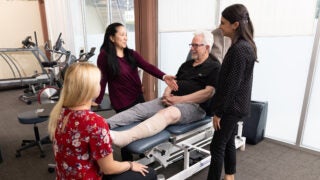
The study found that In identical twins, when one is diagnosed with dementia, both twins have a similarly shortened life expectancy. (Photo/iStock)
Alzheimer’s diagnosis signals risk of shortened lifespan in patient’s siblings
USC and Swedish researchers find shorter lifespans among Alzheimer’s patients’ siblings, even those without the disease.
An Alzheimer’s diagnosis in a sibling raises the risk of a shortened lifespan in other family members — even those without dementia, according to new USC research based on data from the Swedish Twin Registry.
The study, published Monday in Alzheimer’s & Dementia: The Journal of the Alzheimer’s Association, suggests that the same combination of genetics and environment — nature plus nurture — that shortens longevity in someone with dementia may also shorten the life of siblings without dementia.
“We expected a different result. We expected that, in twins where one developed dementia and the other did not, the difference in lifespan would be just like we see in unrelated people,” said lead author Jung Yun Jang, who conducted the research as part of her doctoral studies in clinical science in the Department of Psychology at the USC Dornsife College of Letters, Arts and Sciences.
“We assumed the reason a person who has developed dementia has a shortened life expectancy is because the dementia leads to other medical conditions that affect mortality,” Jang said. “What we’re seeing instead is the increased risk of mortality is not due to just the dementia itself, but also a whole package of other influences that the person brings to their disease.”
In addition to Jang, other authors include Margaret Gatz, a professor of psychology, gerontology and preventive medicine at USC Dornsife; Christopher Beam, an assistant professor of psychology and gerontology at USC Dornsife; and Ida Karlsson and Nancy Pedersen of the Karolinska Institutet in Sweden.
Alzheimer’s lifespan: Longevity affected in siblings with — and without — dementia
The new study is part of Gatz and Pedersen’s landmark body of work on aging and cognition with the Swedish Twin Registry, a large cohort study of more than 45,000 Swedish twins. Across nearly 40 years, their collaborative work with twins — including genetically identical pairs — is designed to tease apart the roles of genes and environment.

Identical twins share 100% of their genotype; fraternal twins (and full siblings) share, on average, 50% of their genotype. Most twins — identical or fraternal — generally share the same rearing environment. That environment includes such factors as early life exposures to pollution, diet, education and physical activity.
This study included 90 pairs of identical twins and 288 pairs of fraternal twins, in which one twin had dementia while the other did not.
Jang confirmed that developing dementia affects longevity in a patient, and that people live for about seven years on average after a dementia diagnosis — a finding that has been confirmed in other studies.
Other findings included:
- In identical twins, when one is diagnosed with dementia, both twins have a similarly shortened life expectancy.
- In fraternal twins, when one is diagnosed with dementia, the twin who has not developed dementia has a slightly shortened life expectancy compared to someone who has no sibling with dementia.
- The research suggests that dementia itself is not the sole cause of a shortened lifespan, but instead a combination of shared genes and environment. Both twins may develop cardiovascular disease, for example, which can contribute to dementia in one and shortened lifespans in both.
“What happens early in the life course is really important,” Gatz said. “You may not be able to change that for yourself, but it does seem like the message to parents is, make sure your kid eats healthy, make sure your kid gets exercise, make sure your kid gets an education. You’re actually contributing to giving that kid a lower chance of developing dementia 75 years later.”
Jang said she was inspired to pursue the research because “one of the most frequently asked questions when a family member receives a diagnosis of dementia is: How much time do we have?”
Jang added, “We believed that asking this question in twins would inform patients and families in making their financial and end-of-life decisions as they deal with this disease that causes losses over time.”
The work was supported by grants from the National Institutes of Health (R01 AG060470 and T32 AG000037); the Swedish Research Council for Health, Working Life and Welfare; the Strategic Research Program in Epidemiology at Karolinska Institutet; Loo and Hans Osterman’s Foundation; Foundation for Geriatric Diseases at Karolinska Institutet; and Karolinska Institutet’s Research Foundation.



